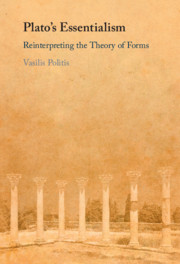Book contents
- Plato’s Essentialism
- Plato’s Essentialism
- Copyright page
- Dedication
- Contents
- Acknowledgements
- Introduction
- Chapter 1 Why cannot the ti esti question be answered by example and exemplar?
- Chapter 2 Why cannot essences, or Forms, be perceived by the senses?
- Chapter 3 Why are essences, or Forms, unitary, uniform and non-composite? Why are they changeless? Eternal? Are they logically independent of each other?
- Chapter 4 The relation between knowledge and enquiry in the Phaedo
- Chapter 5 Why are essences, or Forms, distinct from sense-perceptible things?
- Chapter 6 Why are essences, or Forms, the basis of all causation and explanation?
- Chapter 7 What is the role of essences, or Forms, in judgements about sense-perceptible and physical things?
- Chapter 8 Why does thinking of things require essences, or Forms?
- Chapter 9 Why are essences, or Forms, separate from physical things?
- Chapter 10 What yokes together mind and world?
- Conclusion
- Bibliography
- General Index
- Index Locorum
Chapter 3 - Why are essences, or Forms, unitary, uniform and non-composite? Why are they changeless? Eternal? Are they logically independent of each other?
Phaedo and Republic
Published online by Cambridge University Press: 25 June 2021
- Plato’s Essentialism
- Plato’s Essentialism
- Copyright page
- Dedication
- Contents
- Acknowledgements
- Introduction
- Chapter 1 Why cannot the ti esti question be answered by example and exemplar?
- Chapter 2 Why cannot essences, or Forms, be perceived by the senses?
- Chapter 3 Why are essences, or Forms, unitary, uniform and non-composite? Why are they changeless? Eternal? Are they logically independent of each other?
- Chapter 4 The relation between knowledge and enquiry in the Phaedo
- Chapter 5 Why are essences, or Forms, distinct from sense-perceptible things?
- Chapter 6 Why are essences, or Forms, the basis of all causation and explanation?
- Chapter 7 What is the role of essences, or Forms, in judgements about sense-perceptible and physical things?
- Chapter 8 Why does thinking of things require essences, or Forms?
- Chapter 9 Why are essences, or Forms, separate from physical things?
- Chapter 10 What yokes together mind and world?
- Conclusion
- Bibliography
- General Index
- Index Locorum
Summary
The chapter considers why Plato thinks that Forms are unitary and changeless. It argues that this follows from Plato's supposition that Forms are essences and that the definition of essences must conform to certain requirements.
- Type
- Chapter
- Information
- Plato's EssentialismReinterpreting the Theory of Forms, pp. 49 - 68Publisher: Cambridge University PressPrint publication year: 2021

